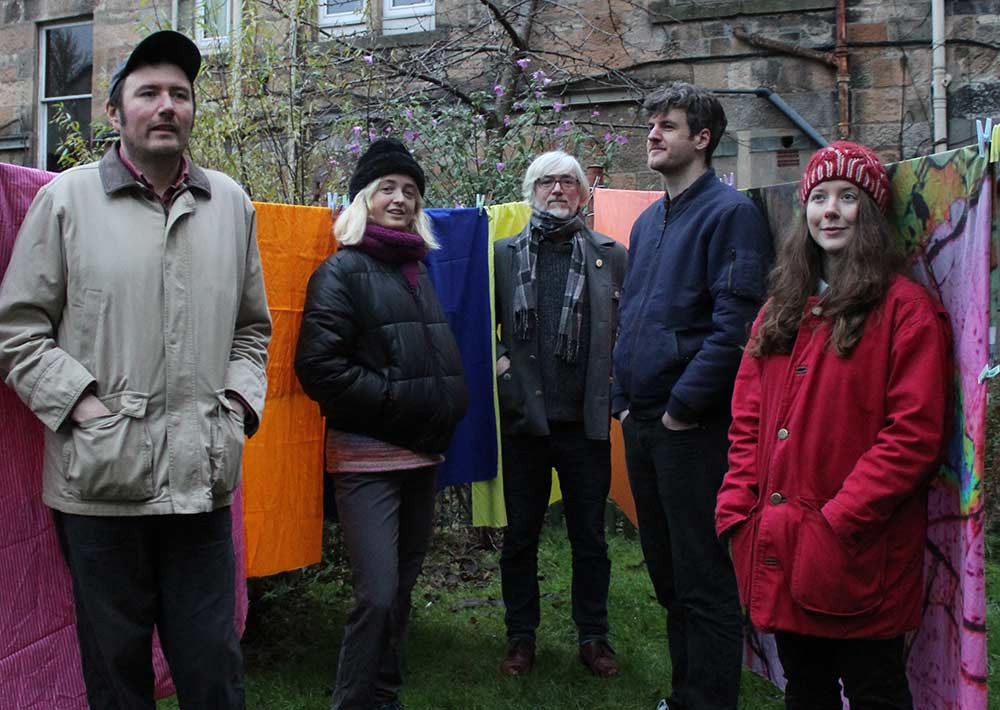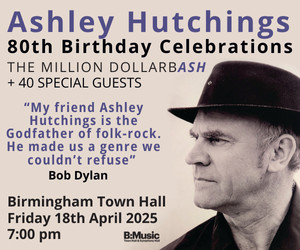Nightshift, a post-punk band hailing from Glasgow, has carved a unique niche in the music scene with their restrained yet powerful sound. Formed in 2019, the quartet – initially comprising David Campbell, Andrew Doig, Eothen Stearn, and Chris White, later joined by Georgia Harris – operates with a distinct DIY ethic and an experimental approach that resonates with fans of artists like Richard Youngs. Their music, often described as “Nightshift Songs” due to its introspective and unconventional nature, truly came into its own with their sophomore album, Zöe.
 Nightshift
Nightshift
While their debut album emerged organically from live sessions in their rehearsal space, Zöe, released this Friday, took a different route. Crafted during lockdown, each member worked independently, creating their parts in isolation before digitally passing them to the next bandmate. This unique process, born out of necessity, shaped the album’s distinctive character and solidified their reputation for creating compelling “nightshift songs”. Here, Nightshift delves into the making of each of Zöe‘s ten tracks, offering a song-by-song exploration of their innovative approach.
Piece Together: Deconstructing and Rebuilding Meaning
Eothen Stearn: Piece Together plays on the homophones “peace” and “piece,” exploring the concept of macro and micro perspectives and the art of collaging disparate elements. For me, the lyrics reflect personal memories of dyslexia and the challenging process of forming words, akin to piecing together fragments of sentences into a cohesive whole. It’s about the fundamental act of writing itself. Ultimately, the song questions the failed promises of Neo-age and 70s hippy ideologies of the radical left, observing how these once-radical ideas have been absorbed and, in some ways, diluted. It delves into the complexities of liberalism and the gradual mobilization of the ‘left’ in contemporary society. This “nightshift song” contemplates the cyclical nature of societal movements and the elusive search for true peace.
Spray Paint The Bridge: From Graffiti to Metaphorical Journeys
ES: The line “Spray paint the bridge” originated from Chris. I built the rest of the lyrics around his phrase. For me, “the bridge” became multifaceted – representing not only the bridge within a song’s structure but also a metaphorical journey, a passage from one state to another.
Andrew Doig: This track, along with Power Cut, predates lockdown. I initially had doubts about whether we could recapture their essence in the same way as our loop-based material, as they felt more traditionally “songy” and demanded an energy I wasn’t sure we could replicate remotely. However, I was happily proven wrong! This song truly ignites, and Georgia’s clarinet performance is simply breathtaking. It’s a powerful example of a “nightshift song” that transcends its origins.
Chris White: This song began in our practice space, much like many tracks on our self-titled debut. Eo often draws lyrical inspiration from random notes I jot down on my phone. This time, I offered “Spray paint the bridge” and a few other lines as starting points. It felt like a continuation of themes explored in our song Flat Earther. In Scotland, we often see amusing flat earth graffiti on road signs and bridges. This line nods to those individuals but also to genuine graffiti artists who create art in challenging, inaccessible locations. It’s about pushing boundaries and making a mark, even in the darkest hours – a true “nightshift song” inspiration.
Outta Space: Lockdown Isolation and Sonic Islands
Georgia Harris: This song emerged from a quirky, eerie bass loop created by Doig, which immediately captivated me. I spontaneously started singing over it, recording vocals quickly and adding clarinet later. It was years since I’d last recorded myself singing, making it feel a bit vulnerable, but it all coalesced beautifully once Chris and Eo added drums, keys, and effects. Created during strict lockdown, when leaving my apartment felt impossible, my world had shrunk dramatically. I used a large floor rug in my living room as a self-made ‘island’ – my recording space, where all my equipment was piled. This strange setup provided comfort and a dedicated zone for music creation during an unsettling time. This “nightshift song” reflects the feeling of isolation and the creation of personal space within confinement.
Make Kin: Beyond Bloodlines, Embracing Band Bonds
ES: Make Kin explores kinship as a way to engage with complex environmental and reproductive issues. It’s about valuing connections beyond blood relations, challenging expectations, control, and ownership, particularly concerning women’s and womxn’s bodies. The song celebrates kith, kinship, and friendship – emphasizing how a band itself embodies a powerful bond. This “nightshift song” is an ode to chosen families and collaborative spirit.
 Nightshift
Nightshift
Fences: Breaking Down Barriers in Sound and Vocals
AD: My vocal and bass parts are built upon an incredible guitar loop Georgia crafted. An extended version of this song existed initially, but we trimmed it down, perhaps for a future rarities compilation. I recall working on this relatively early in the process, spending a lockdown day developing my contributions. There was no template for this remote collaboration, no precedent to follow. Truthfully, I hadn’t intended to sing much beyond backing vocals, given the band’s already strong vocalists. It felt almost unnecessary. But without predefined roles or expectations, I simply started singing. Figuring out the live performance of some of these “nightshift songs”, including this one, will be an interesting challenge!
Power Cut: Surrendering to Darkness, Finding Creative Sparks
ES: The lyrics for Power Cut stemmed from a real power outage I experienced in Marseille during a three-month artist residency in winter 2019. It wasn’t a simple fuse issue but a complex electrical problem in the hallway. I had to seek help from a neighbor, a kind older man in dressing gown and slippers, and we struggled to communicate about electricity in my limited French. Ultimately, we couldn’t fix it. I spent the evening alone in the unfamiliar apartment by candlelight, my eyes slowly adjusting to the darkness. This experience triggered reflections on my dependence on power, technology, and carbon consumption. My phone battery was dead. I began thinking about grid systems, electrical grid failures, hippy utopias, climate activism, blackouts, green economies, and the dream of off-grid living. I felt confined by urban infrastructure. My mother, a gardener, possesses deep, inherited knowledge of nature, which I haven’t retained. Yet, I work in the city as a Climate Action Community worker – a contradiction that highlights my complicated relationship with technology.
I’d visited Slab City near Joshua Tree, while working for an artist there. People lived off-grid in geodesic domes – a microcosm of society with radical hippies juxtaposed with a large marine base. These contrasting images and ideas flowed into the song. The power cut became a metaphor for a state of powerlessness in the body, death, light, hope, energy, and flow, especially during 2020. I missed family and friends, recalling childhood memories in nature. Dave’s “waterfall guitar,” as I initially called it, meshed perfectly with the keys. The building drums and Geo’s clarinet amplify the feeling of nostalgia and optimism in this introspective “nightshift song”.
Infinity Winner: Coping with Chaos, Finding Humor in the Absurd
AD: Lyrically, this song is about a weekend last summer when my mother was hospitalized. I was staying at her apartment in Troon, Scotland, trying to understand the situation over the phone. We were in partial lockdown, the band was editing the album, and a flurry of WhatsApp messages about it provided excitement amidst the tension of waiting. The weather was surprisingly good, but the world felt chaotic and surreal. I felt a sense of madness, and then, hilariously, my mum’s TV broke – the final, absurd confirmation of truly baffling events. The song is built around a beautiful loop David sent. It’s an odd track, but I appreciate its reflection of a strange and unsettling time, capturing the feeling of a “nightshift song” even in daylight.
Romantic Mud: Foraging, Time, and Off-Kilter Guitars
ES: The lyrics for Romantic Mud came to me while running. I repeatedly saw a man doing a crossword puzzle amidst blooming wild garlic. It made me think about foraging, the passage of time, and the rich, unknown inner lives of individuals. There’s another story to the guitar parts, which the others can elaborate on! Dave and I recorded our guitars out of sync with each other. I don’t recall the exact method, but creating parts separately made this easy. My guitar didn’t sound as intended, but it evolved into something new that others liked, so it stayed. The off-kilter guitars felt fitting – as if we were all navigating through mud, together. This “nightshift song” embraces imperfection and unexpected outcomes.
Zöe: Reclaiming the ‘Live Drive’ Against Commodification
ES: Zöe was inspired by Rosi Braidotti’s concept from her book The Posthuman, a contemporary reading of philosopher Baruch Spinoza. “Zöe” signifies ‘live drive,’ stemming from ‘conatus.’ We considered naming the album ‘Contus,’ but it seemed too pretentious. ‘Conatus’ is defined as “an innate inclination of a thing to continue to exist and enhance itself.” The Posthuman explores interwoven complexities of mediated societies, genetically modified food, advanced prosthetics, robotics, and reproductive technologies. Braidotti examines the sustainability of our planet within market economies that profit from control and the commodification of life.
Zöe resists this commodification. Braidotti’s concept is a feminist reclaiming of the communal public sphere, anti-privatization, and a striving for social and environmental justice. Zöe became a character embodying this striving for me during songwriting. The album also carries a sense of nostalgia, created during a time of reflection, re-evaluation, and future projections. Questioning current lifestyles and imagining new possibilities. Zöe embodies a desire to persist despite adversity, a drive inherent in even the smallest creature, compelling us to continue. It felt relevant to the collective grief of the year we wrote this album, yet also to the power of solidarity and collective action. This title track, a quintessential “nightshift song”, encapsulates the album’s core themes.
GH: By the time Zöe reached me, it felt complete, so I aimed for minimal melodic additions. Inspired by improvised percussion, like Tall Dwarfs, I experimented with bottles, pots, pans, and containers to find suitable sounds, much to my partner’s dismay as he worked from home! He had to investigate the commotion!
Receipts: Delicate Loops and Acoustic Intimacy
GH: This song evolved from one of Dave’s delicate guitar loops. As with all tracks on this album, it was fascinating to witness the song’s transformation layer by layer. Necessity drove this process, but it was incredibly enjoyable! Typically, I repeatedly listened to the loop, improvising melodies without a specific lyrical intention. This iterative, improvisational approach is fun and spontaneous for me, unlike consciously ‘writing’ lyrics, which feels pressured and less enjoyable. I prefer listeners to interpret the lyrics personally. Adding slide guitar was a highlight – I was thrilled to finally use it! It often sits unused, but it felt perfect for this song. Although I love acoustic guitar, it likely wouldn’t have featured on the album had we recorded in a studio, as I primarily play acoustic at home. This intimate “nightshift song” showcases the beauty of home-recorded spontaneity.
Zöe was released on February 26th via Trouble In Mind Records. Discover more at their Bandcamp page: nightshiftgroup.bandcamp.com
Nightshift’s Zöe is a testament to creative resilience and the power of remote collaboration. These “nightshift songs,” born from isolation yet brimming with collective energy, offer a compelling and unique listening experience, solidifying Nightshift’s place as innovators in the post-punk landscape. Their DIY approach and experimental spirit, combined with deeply thoughtful lyrics, make Zöe an album that resonates long after the night is over.

 Ashley Hutchings banner
Ashley Hutchings banner